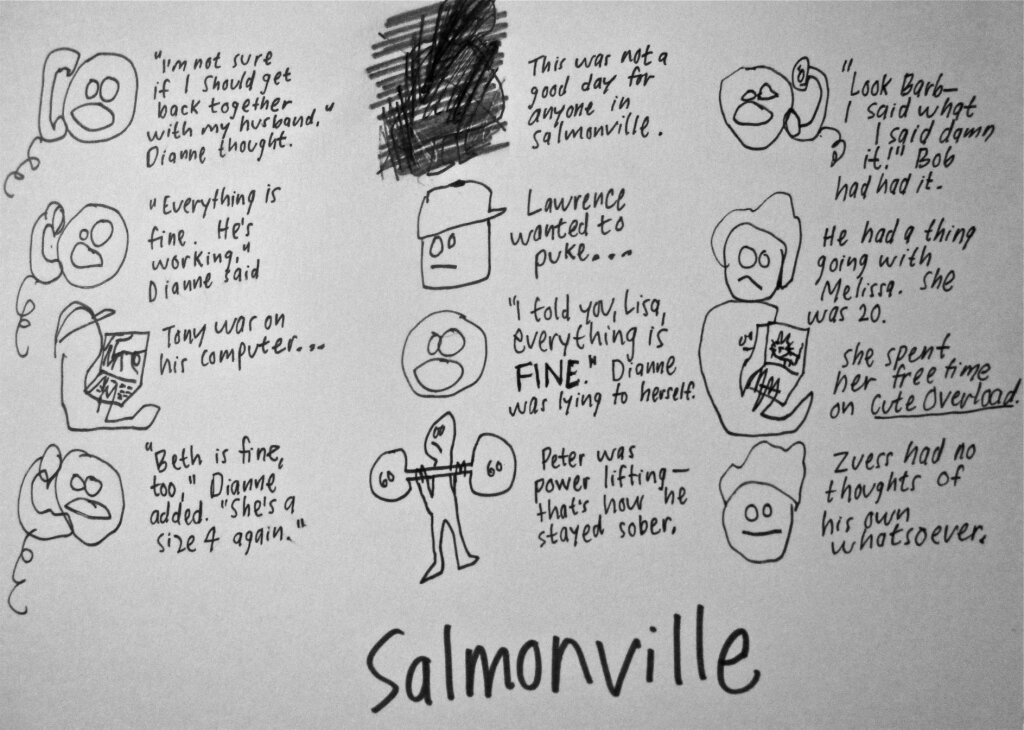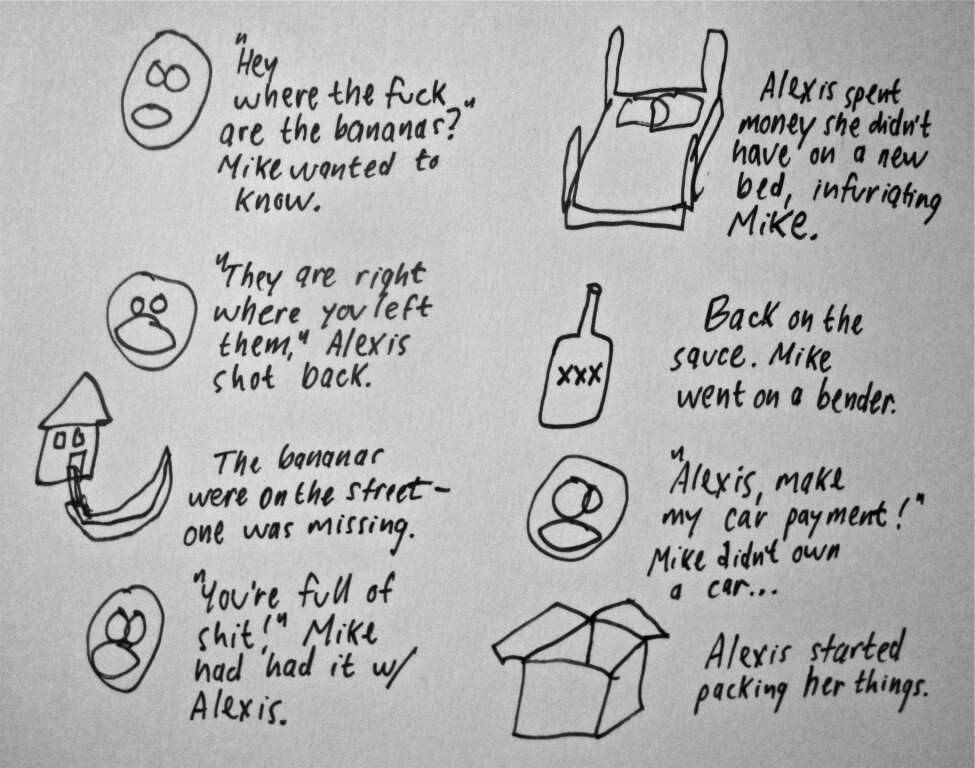There are many poets who enjoy disliking William Carlos Williams. He wrote poems that seem distinguished only by their adherence to the tossed off. They make no major claims. They seem jotted off.
So why study the man at all? First, it is hard to see Williams because he is everywhere, in all the schools of American poetry. He took the English conversational lyric as invented by Coleridge and developed by Wordsworth and turned it toward American speech patterns: OK, sure–the sense of a self consciously casual utterance, language that was wrought from a busy life and ranged between the phatic, the cranky, the ecstatic, the overt, and the obvious.
But we must pause at the word obvious. Stating the obvious is not easy. Human beings tend to mistake mystification for intelligence. Abstractions appeal to us. We forget that even “chicken” is an abstraction. It is a word for an animal. It is not the animal. So perhaps we only believe things have meaning when they have been twice abstracted: first by word denoting thing, then by word (which is symbol) implying something else in the verbal universe (word as symbol for thing plus word as symbol for abstracted word: chicken (thing) plus word chicken-symbol–plus chicken as truth, justice, and the American way). By this process, every word becomes “and”, a conjunction, that which separates as it joins, joining and separating from the thing it denotes and the moral, emotional, intellectual, and historical meanings it connotes. In short, our language becomes a process of mystifications which have lost their original purpose, or have revealed the hidden agenda of all mystifications: power and exclusion.
All street lingo, scholastic jargon, all supposed “verbal rigor” is meant to appeal to the initiated and to exclude the uninitiated (and this includes the language of those who feel excluded). Williams was not against this nearly airtight law of verbal action. He was practicing a new, or, rather, reconstituted rigor: the rigor of the obvious, contact with words for things as things made out of words–double contact, rather than double abstraction.
Williams wanted to make contact with the thing, and then make contact with the thing made out of words. He was not just interested, as in a Haiku, with rendering a thing’s “thingness,’ but he also wanted to make contact with it as a verbal construct, as a thing in its own right. He was interested in a poem as a thing made out of words–as an object, an actual artifact, something as tangible as a chicken. Williams was interest in type–in the words as they were placed upon the page. He was interested in the spacial orientation of type–the “just so” latent within the act of typing words upon a page.
If we know this about Williams, then we can assume three things that may be important to entering into any Williams poem:
1. Rigorous attention to the obvious.
2. Rigorous attention to The placement of the obvious as a “just so” upon the page.
3. The contact with the thing, and the enactment of the thing made out of words as a thing in its own right–which is a second contact. Double contact as opposed to double abstraction.
In this system, abstraction does not disappear, but is taken as the given. Kafka wrote: “the moment you write she looked out a window, you have already begun to lie.” Kafka is not being profound here. She is doing much more than looking out a window, but the artist has selected that one particular action to render in words. Selection is a lie of omission. Even when we tell a true story, we are omitting details. We call this focusing on the significant, but it is only significant because we say it is.
We have made a judgment. Our judgment is distorted by necessity. We have a story to tell. We are never in life, but always in a narration, a process of selection, placement, and applied meaning which we call consciousness. Williams has two aesthetic tasks: one, to be rigorous about the thing at hand in such a manner that we are temporarily taken out of our narrative, and thrust into a kind of “stupidity” before the object (I use stupidity in its full sense, not as lacking intelligence, but as being stunned out of intelligence for a moment, being stupefied, disengaged from one’s usual systems of applied meanings, narratives, and assumptions); and two, to enact a ritual of placement that does not echo a received truth, but becomes its own construct–that imitates the dynamic, and kinetic force of the organic, of “nature” as opposed to merely holding a mirror up to it.
The natural breath Williams advocated was not actual speech, but the artistic placement of everyday speech rhythms and lingo into a thing called a poem. Rather than the abstract twice abstracted, Williams desired the actual twice actualized–first as something one touched through words, and then as something one made (and unmade) out of words. This double actualization has its aporia, its own deconstruction in that one makes contact with the thing not to know it, but, rather, to use it as a new energy–to “unknow” it in the most vital way possible, and to construct a thing made out of words that will contain the energy of what one has “unknown.” To “unknow” chicken as word, is to make contact again with both the thing and the thing’s essential energy used to construct a new thing made out of words. Not a chicken or a chicken as symbolic truth–but a poem that has all the life and thingness of a chicken, and must be taken as it is–beyond paraphrase, beyond mere analysis of meaning, beyond the usual apparatus of mystification.
So, armed with some knowledge of the artist’s intentions, let’s apply these intentions to an actual William Carlos Williams poem.
Iris
A burst of Iris so that
come down for
breakfast
we searched through the
rooms for
that
sweetest odor and at
first could not
find its
source then a blue as
of the sea
struck
startling us from among
those trumpeting
petals
1. Rigorous attention to the obvious. The title says “Iris.” The first line qualifies a “burst of Iris.” Things burst when their energy cannot be contained. So this is not an inactive iris. It is, in a sense, the ecstatic energy of the Iris–its “bursting.” Williams has made an event out of a flower–something we might notice as “Oh look at that–an iris, how pretty…where’s the orange juice?” Usually, we take decorative flowers for granted, especially upon awakening. He is drawing our attention to something we might take for granted. He is saying: “Look! Look! An Iris! Better yet…a burst of Iris! We have not seen it yet. We apprehend it, through the implication of smell, through its essential energy as a burst of fragrance. Here, selection creates the lie of omission in the best sense: the whole house has become alive to an iris. This is stupidity as I mean it: to be stunned out of rational priority–to make a big thing out of something we might not even notice. To be stunned into the obvious. We are told the “we” of the poem searches through all the rooms of the house. This is a lively contact with a flower indeed! Williams effusiveness over mundane and obvious things infuriates some. I find it delightful.
Next, we get “sweetest odor–“: the Iris dominates as an odor. They have yet to see the Iris, and when they do, it is not the Iris per se, but its blue: then a blue as/of the sea/struck.” So this Iris dominates the house without being seen, and when it is seen, it strikes, startles with its blue among its “trumpeting petals.” Smell becomes color becomes sound–a loud and vital awakening to the obvious!
2. A rigorous attention to the placement of the obvious as a “just so” upon the page. Well, the first line of every tercet is the longest, the second the next longest, and the last the shortest. This does not vary. It is a formal law peculiar to the poem. In addition, there is no real sentence or punctuation in the poem, yet its clarity cannot be questioned. This shape is played off against what is a sentence fragment–no sentence at all. The lack of punctuation is not sloppiness on Williams’ part here, but a vital aesthetic aid to the synasthesia and sense confusion of the poem. Everything, including the grammatical ambiguity of this poem is intentional–especially “that.” If the poem ended at “that” we would think “that” referred to the burst of Iris, but the stanzaic break adds odor at the beginning of the next stanza. Many free verse poets do stanzaic enjambment but it is too often done for neatness and symmetry rather than organic form’s sake. Williams bleeds the sense of the previous stanza into the next, but each stanza is truly its own organic moment within the body of the poem. This is true form.
3. Contact with the thing and the enactment of that contact with a thing as a thing in its own right. The whole of the poem is the contact with Iris, in all its sensual glory, as well as a mixing of the senses in an ecstatic apprehension of the flower. The poem proceeds and becomes its own thing by way of making contact with the Iris–with the artist’s apprehension of Iris. The word Iris functions then as a sort of conjunction between the thing called Iris and the poem called Iris–the thing made out of words.
Williams says what is before us–at this moment, and at this odd hour–is enough to make a vital poem, “by defective means.” And if we surrender ourselves to his intentions, we will discover a poet as deliberate in his art, and as eager to master it as any other great poet of the 20th century.





